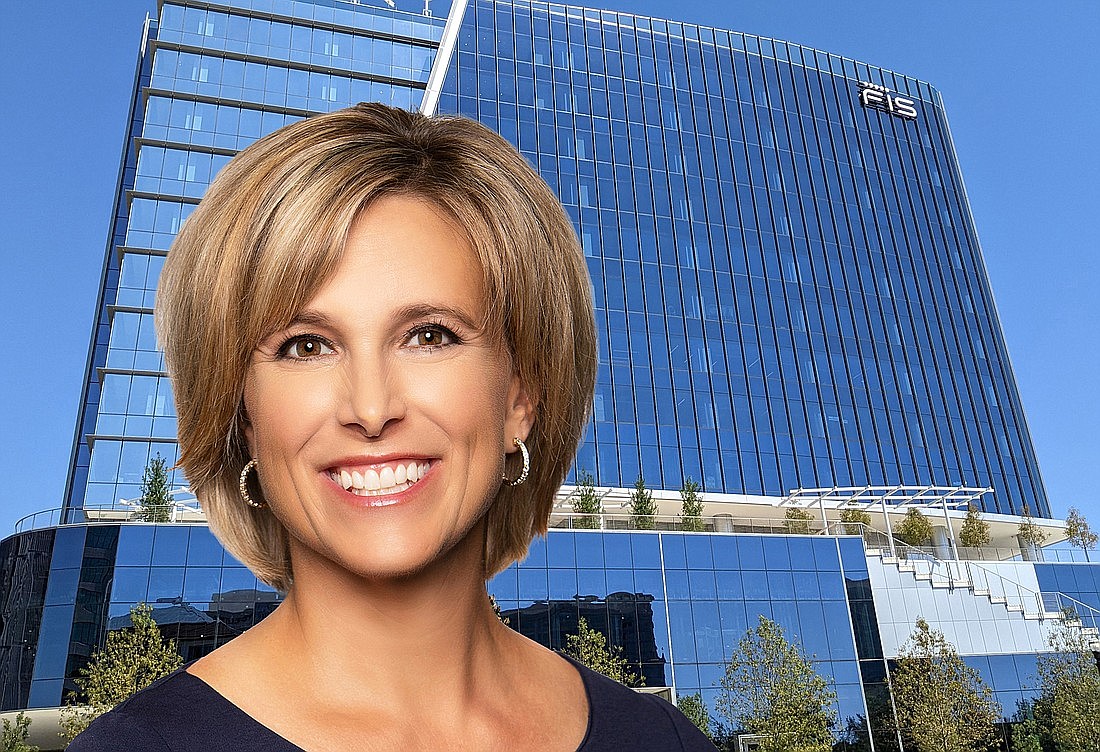Special Offer: $5 for 2 Months!
Your free article limit has been reached this month.
Subscribe now for unlimited digital access to our award-winning business news.

As Fidelity National Information Services Inc. refocuses on its core banking technology business, CEO Stephanie Ferris said she isn’t concerned about the impact of recent high-profile bank failures.
“While recent developments have driven volatility in markets and across the banking sector, we do not expect this activity to impact us significantly in the near term, and believe FIS is well positioned to be a beneficiary of the recent disruption in the long term,” Ferris said in an April 27 conference call after FIS reported better-than-expected first-quarter earnings.
The Jacksonville-based company reported adjusted earnings of $1.29 a share, 18 cents lower than the previous year but higher than its forecast of $1.17 to $1.23.
“This outperformance was driven by a combination of both stronger execution as well as better-than-anticipated macroeconomic impacts, including consumer spending and higher levels of deposit account and transaction growth across the financial services sector,” Ferris said.
She said the number of accounts processed by FIS technology has increased since the failure of Silicon Valley Bank in March.
“As depositors disperse funds across multiple bank accounts, ultimately driving more account growth, FIS is well positioned to benefit as a leading provider of core banking technology, particularly to large financial institutions, which is the primary base of our FIS business,” she said.
FIS expanded its business beyond banking technology with the 2019 acquisition of merchant payments processor Worldpay Inc.
However, after three years of disappointing results from that business, FIS announced in February it will spin off Worldpay as a separate company.
Ferris said in the conference call that FIS is making progress on the Worldpay spinoff, which is expected to be completed in 2024.
She also said cost-savings plans announced when Ferris was promoted to CEO in late 2022 are progressing.
“I’m confident we will not only deliver on our 2023 cash savings target of $500 million, but achieve at least our $1.25 billion of cash savings target by year-end 2024,” she said.
Landstar System Inc. reported first-quarter earnings of $2.17 a share, down from $3.34 the previous year, with revenue dropping 27% to $1.436 billion.
“Given the current freight environment with soft demand and readily available truck capacity, Landstar performed relatively well in the 2023 first quarter,” CEO Jim Gattoni said in the Jacksonville-based trucking company’s April 27 conference call.
He said comparisons to last year are difficult because Landstar reported record-high quarterly results in the first quarter of 2022.
Gattoni said the company continued to see lower truckload volume in April but he’s hoping patterns return to normal in May and June.
Landstar is projecting second-quarter earnings of $1.90 to $2 a share with revenue of $1.4 billion to $1.45 billion, which would be down from second-quarter 2022 earnings of $3.05 and revenue of $1.975 billion.
Jacksonville-based Black Knight Inc. said in Securities and Exchange Commission filings that shareholders overwhelmingly approved a revised buyout offer from Intercontinental Exchange Inc. at an April 28 special meeting.
The deal first announced a year ago remains in limbo as the U.S. Federal Trade Commission seeks to block it, citing anticompetitive effects of the merger on the mortgage technology market.
A hearing is scheduled July 12 before an administrative law judge of the FTC on the agency’s objections to the deal.
New York-based ICE has said it will challeBnge the FTC’s complaint at the hearing and it intends to move forward with the buyout.
Deutsche Bank reported higher first-quarter earnings but also said it is looking to save money with more job cuts.
The Germany-based bank employs about 2,000 people in Jacksonville, its second-largest U.S. office outside of New York.
The company employed 86,712 people globally at the end of the first quarter, about 10,000 fewer than it had five years earlier when Christian Sewing was appointed CEO.
Sewing said in an April 27 conference call the company plans to cut non-client facing jobs as it focuses on “rightsizing” the company.
“During the second quarter we will begin to reduce our senior non-client facing workforce by 5% and will limit new hiring without compromising our controls,” he said, according to a transcript of his remarks posted by the company.
He did not provide more details.
Deutsche Bank said first-quarter earnings rose 8% to 1.3 billion euros, or about $1.43 billion in U.S. dollars.
“The first quarter was marked by turbulent conditions in the banking sector, particularly in March, in addition to the macroeconomic challenges,” Sewing said.
“However, our transformation has provided us with strong foundations, which enabled us to navigate these challenges successfully.”
The St. Joe Co. said April 26 that first-quarter revenue rose 12% to $73 million, helped by a big increase in hospitality revenue as it expands its hotel business.
However, earnings fell by 5 cents a share to 18 cents, due in part to pre-opening costs as it prepares to open four hotels in the second quarter.
Panama City Beach-based St. Joe also said real estate revenue fell 5% to $35 million as it sold more homesites but at a lower average price than in the first quarter of 2022.
St. Joe was a longtime Jacksonville-based conglomerate that moved its headquarters to the Florida Panhandle in 2010 to focus on developing its large land holdings in that region.
Your free article limit has been reached this month.
Subscribe now for unlimited digital access to our award-winning business news.